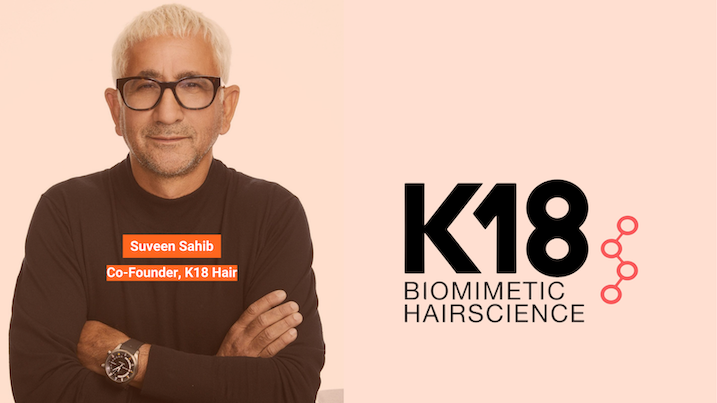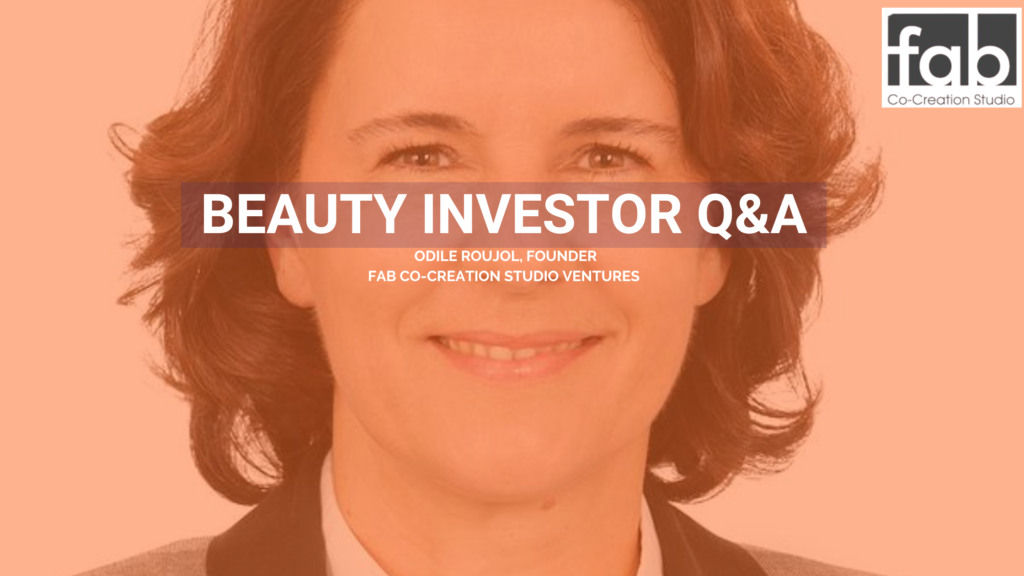In this beauty investor Q&A feature, Odile Roujol, founder of Fab Co-Creation Studio Ventures, discusses the challenges of seed-stage funding, the evolving role of AI, and key trends shaping the future of beauty and wellness. She shares insights on what drives successful founders and the critical support needed for early-stage ventures.
Investor: FAB Co-Creation Studio Ventures
Location: Los Angeles, California
Stage: Seed & Early-Stage
Q1: With digital advertising getting expensive, retail becoming tougher, and supply chain woes continuing to be challenging, "How do you see the ventures evolving their growth approach in the future?"
Odile:
2023 and 2024 were complicated years for founders at the seed stage, especially in consumer tech, since funding became difficult, and bridge money could not help for an extended period.
In a healthy way, I saw many founders taking more time to define their top priorities, care for their audience and community, and ensure customer satisfaction.
In the end, even if it takes more time to grow, having an engaged population that loves your brand and repurchasing your products enables you to be positive in Ebitda sooner rather than later. It’s a virtuous cycle!
Q2: How do you see tech & AI influencing & contributing to the analysis of a deal & success of a venture?
Odile:
The seed stage is all about identifying the fabulous founders at the right moment. I don’t think AI will help that, as much as founders gaining a lot of visibility with editorials and beauty summits!
However, I’m a big believer in the power of customer insights, and leveraging customers’ data will be fundamental for companies to scale.
Rohit: Where do you see the biggest opportunity & how?
Research
Deal Sourcing
Deal Diligence & Analysis
Marketing
Portfolio Support
Reporting
Odile:
Definitely portfolio support.
I spend a lot of time with the founders in Fab Ventures’ portfolio. I believe the seed stage means adding skills to the table,beyond an investment.
It means deep dives on demand. It means helping founders help each other by gathering them in quarterly meetings.
The latest meeting was hosted alongside Suveen Sahib, co-founder of K18 Hair, sharing his advice with other founders (k18hair was acquired in Q1, 2024 by Unilever for $800M value, as revealed in the media)

Suveen talked about the network of hairstylists as brand prescribers and advocates, TikTok’s impact as they were so successful in their content, and the importance of education (for them, biomimetic formulas and bioscience vs. other haircare brands).
The one before, Carlos Baretto, founder of Cleverman, shared his best practices on Amazon as a significant channel for their brand, a pure D2C play.
Q3: What are the 3 biggest consumer trends you are watching very closely at FAB when it comes to beauty and wellness, and what's your take on each of those three?
Odile:
All my other VC friends are aware that I’m particularly obsessed with health tech and holistic beauty and wellness.
The future belongs to brands that help people track their own data and improve their health through their daily routine: diet, sport, sleep, and supplements.
Skin is the biggest visible organ of our body. As Chris Mirabile (biohacker and founder of NovosLabs) would say, we want to stay younger for longer. Having metrics about your biological aging can help with an epigenetic test or blood markers as measured by FunctionHealth.
Veracity has positioned itself as a metabolic health company, and Metabolism Ignite (a “natural ozempic” product without the side effects) has not only won many awards but has a huge traction.
Yina is about traditional Chinese Medicine and has supplements. Shaz and Kiks is about hair care and Ayurvedic beauty.
The second trend for me is personalized beauty for good this time!
Hellobiome is a data hub used by iconic brands, measures your microbiome, and helps you to choose the right products and soon the right ingredients.
Thanks to computer vision and robotics, Luum enables you to choose your relevant eyelashes and have them in less than the usual two hours.
The third trend is retail tech, with the right content and target.
I’m betting with Nectar Social AI for retail media, BuyWith, and Trendio (expert solution for TikTok shop) on new ways for brands to interact with their community, with video, exciting content, and measuring results.
Q4: Is there a trend around investors wanting to fund beauty and wellness brands? Who(type) is staying in the space?
Odile:
As you know, most of the funds are above $100M and need a massive return for their LPs; they look for exponentiality.
Most of them are now on to the next layer of GenAI applied by verticals, based on the infrastructure underway, built thanks to big players such as Open AI, Antropic, Mistral AI, etc.
My VC friends, obsessed with consumer tech(including beauty tech), are staying in the space for a good reason. It’s part of their lives, and they do it because they love what they do.
Q5: How do you see the future of purpose-led brands, and what do founders get wrong about claiming/wanting to be a purpose-driven brand?
Odile:
People want authenticity.
There is nothing wrong with claiming to be purpose-driven if you are!
David Yi is a Korean American activist who is building a gender-inclusive brand, Very Good Light. He’s assertive in his messages and true to who he is.
Cynthia Plotch raised her voice after the POTUS decision. She and her co-founder are building a brand, Winx Health, that takes care ofwomen’s health, from pregnancy tests to UTI infections.
Nyakio Grieco is a black founder who inspires many. With her co-founder Patrick Herning, she’s welcoming all BIPOC brands on her platform and marketplace, thirteen lune. For good reasons, she is invited to many interviews every month.
My advice to founders at the seed stage, especially purpose-driven brands, would be to be true to who you are.
Q6: What are the traits common to all the super successful beauty founders you have funded?
Odile:
Talent, hard work, and waking up obsessed with their company.
I met Shai Eisenman, founder of Bubble, less than 4 years ago, when I invested pre-revenue; she’s now fast-growing with partnerships with key retailers in the US, UK, and Australia and an engaged GenZ community. She cared about them and was putting forward the mental health issues of their generation during the covid with donations to try to help, too.
Q7: What is common to the "idea: problem-value proposition(solution)" equation for all the super successful ventures you have funded?
Odile:
-Science-based. Excellent products, for sure.
-Knowing your superpowers (you can’t have them all and, as a founder, need to be well surrounded by team and investors)
-Data! Knowledge of your customers, having insights.
Q8: What is the role of the FAB Fashion and Beautytech community (15,000 founders and VCs in 19 chapters worldwide) & how do you see it evolving?
Odile:
The first meeting was hosted in San Francisco at my home (not my garage!), now, we have 4000 subscribers to the newsletter (free) and meetings every two months in Asia, America, and Europe.
Fab chapter leaders are founders and investors who organize in-person meetings. Being part of the conversation, in a “circle of trust,” helps founders feel less lonely and stressed during the period.
We receive many proactive, inbound calls to Fab Ventures, as people know us in the beauty and well-being space, sustainable fashion, and new commerce.
It’s part of our brand, for sure! Even if no one is earning any money from the events, it’s the “pay it forward” culture, dear to Silicon Valley: sharing what you have learnt and helping each other.
Q9: Fab Co-Creation Studio does all the due diligence on the venture and the founder, carefully evaluates the idea and the value proposition and the traction, provides the necessary funding, works closely with the founders and advises them, and has the network to help the venture succeed.
Despite all of the above, what risk factors impact a venture's eventual success? Which risk factors do you foresee as critical to a venture's success in the future?
Odile:
The main risks are a founder giving up in the early stage or two co-founders needing to get along. It’s about the people.
Another risk is running out of cash before having the relevant milestones to find new investors. Choosing priorities carefully and being laser-focused on execution matters.
I’m one of the VCs warning founders to wait to sign with big retailers. First, you will have to pay for inventories, putting much pressure on your shoulders. Second, as a retailer, they need the traffic!
Focus first on organically growing your company, then work with smaller retailers, and only push the button with the big ones when you are ready!
Q10. FAB invests in purpose and data-driven founders at the intersection of Conscious Beauty & Sustainable Fashion, Tech and Impact Investing. Why should these founders have FAB as their first choice for an investor?
Odile:
There are many brilliant VCs with a financial background.
I’m an operator. I’m also the ex-CEO of a global brand present in 135 markets and with more than 4 billion dollars in revenues.
I’ve spent more than 25 years of my career in beauty and luxury corporations, travelling in every market, managing a brand and a P&L (my latest job was CEO, Lancôme when expanding to China and Asia, in addition to being a leader in Europe and the US in the prestige market). Then, I worked for many years in the tech industry as Chief Data Officer for a leading EMEA telco company.
Founders know I spend more time on Fab Ventures’ portfolio than the pipeline. They are also aware they will benefit from a powerful network, including some of my LPs and anchor investors, who are luxury and beauty corporations, Family offices, and BAs in the fashion, retail, and tech space.
SUMMARY
Odile Roujol, founder of Fab Co-Creation Studio Ventures, acknowledges that 2023-2024 were difficult years for seed-stage founders due to rising costs and supply chain challenges.
However, she sees founders increasingly prioritizing customer engagement and brand loyalty, which, though slower to scale, fosters sustainable growth and positive EBITDA. While she believes AI may not play a major role in identifying founders, Roujol stresses that leveraging customer insights and data is crucial for scaling.
She highlights key trends, including health tech, personalized beauty, and retail tech, as transformative in the beauty and wellness sectors. Roujol believes successful founders are driven by talent, hard work, and a focus on science-based, customer-centric products.
She emphasizes the importance of portfolio support, offering hands-on guidance and network building, while cautioning that early-stage risks like running out of cash or prematurely signing with large retailers can derail growth.
Looking to fundraise?
Attract 3,000+ Beauty & Wellness investors in North America using full canvas info on Jumpurse
&
Book 3-5 investor meetings/day on Jumpurse fundraising platform

